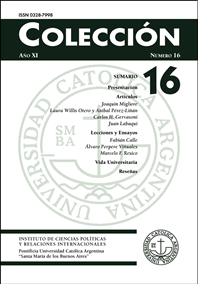The idea of progress in the thought of David Hume
Keywords:
Political philosophy, Hume, Development, Theory of knowledge, Political ethicsAbstract
The enlightened thought has, in general, a strong confidence in the development of human society. Nevertheless, they assume this notion in diverse ways. In the particular case of David Hume, representative of the Scottish enlightenment, it seems difficult to reconcile the idea of development and the repeated affirmation of a “natural course of history” with the results of his critique of knowledge. Because of it, the following essay tries to show the private way in which David Hume assumes this idea. In the first place the main gnoseological conclusions are analyzed. Then their moral reflection is undertaken, seeking especially the ideas of utility and interest and its relation with the origin of society. The author tries to show that is here where seems to be the base of Hume’s progressism. From this point on, some thesis of his political papers are revised, specially the role of the authority, seeking to show their agreement and dependence with the previous.Downloads
Download data is not yet available.
Downloads
Published
2017-11-23
How to Cite
Perpere Viñuales, Álvaro. (2017). The idea of progress in the thought of David Hume. Colección, (16), 173–195. Retrieved from https://e-revistas.uca.edu.ar/index.php/COLEC/article/view/764
Issue
Section
Lecciones y Ensayos
License










 Colección
Colección